I'm gettin' ya! Dang, I think I'm going to have to locate some "materials" (peppers, jars) this weekend. Inspirational!
-
If you have a question about commercial production or the hot sauce business, please post in The Food Biz.
You are using an out of date browser. It may not display this or other websites correctly.
You should upgrade or use an alternative browser.
You should upgrade or use an alternative browser.
tutorial Fermenting Peppers 101
- Thread starter RocketMan
- Start date
I elimination the air space all together.
I ferment in 1/2 gallon wide mouth Ball canning jars. Quarts work too.
I fill the jar with goods to within an inch or so of the rim.
I weigh down the contents with a clear glass tea candle holder.
Watch the size on these, many are a bit too big to fit. I got mine at Dollar General.

I them top off the jar to the rim with brine, and set a canning lid on top (no ring) held in place with a weight.
Place the jar in a container to catch potential burp.
No air space, no problems.
Right, that's the general idea is to keep the mash below the brine, usually by use of weights. Eventually I'm going to quit fucking around with hackish solutions and buy a few of those Harsch crocks which were made for this exact purpose.
http://www.canningpantry.com/sauerkraut-crocks.html

Right, that's the general idea is to keep the mash below the brine, usually by use of weights. Eventually I'm going to quit fucking around with hackish solutions and buy a few of those Harsch crocks which were made for this exact purpose.
http://www.canningpa...aut-crocks.html

I have a Harsch crock that I sometimes use for sauerkraut.
They are not without their issues, price being the main one and the stone weights require special care (sanitation or covering) to prevent the growth of kahm yeast and molds.
What I ferment in the $120 Harsch crock I can also ferment in three 1/2 gallon $2 canning jars with less fuss.
~Martin
This thread has been hugely inspirational. I really appreciate the pictures. I'm going to start my first mash this evening. I'm planning on including red habaneros, pearl onions, a head of garlic, and an acorn squash. I'm planning on using a 6% brine with a natural fermentation (although I might be able to drain a little whey off of my wife's yogurt tomorrow morning). I don't have an airlock setup for this batch, but I'm hoping to get one ordered soon for my next batch.
Ok,I've read and reread this about 4 times to make sure I wasn't missing something and, please correct me if I'm wrong but your using apple juice as an ingredient in your sauce and cook the ingredients to a point prior to pitching the yeast to the mash just as we boil the wort prior to pitching yeast in beer. There is something in the cooking process that causes the apple juice to lower the ph of the mash and then the yeast converts the sugars in the apple juice thus removing the apple flavor in your final sauce giving you a sauce with proper ph with out any sourness to it. Just the wonderful flavor of the peppers and other ingredients you've used.
I'm raising 1 eyebrow and thinking "fascinating"
It isn't "something in the cooking process" that lowers the mash pH, it is the boiling off of water as I cook the mash. If you take two gallons of a liquid with a pH of 4 and cook it down to a gallon, what do you think happens as that gallon of water is distilled off in the form of steam? You end up with a lower pH.
Hi Nova...Could you explain your process...and what is its shelf life at room temp. before the yeast takes over and stamps its own flavour on your sauce...or do you use sulfur dioxide or other such 'halting' chemicals to arrest the yeast at a certain point (as in the wine industry) , or do you just like the taste of the Ethanol/alcohol produced by the yeast sugar relationship ?. I am very curious ...
Not using campden or any other additive to stop the yeast, as i don't need to. Yeast go dormant when they don't have any food to eat. So, once they've fermented out the sugars in the mash, they go dormant. There are two stages in the life cycle of brewing yeast: aerobic and anaerobic. Before you pitch yeast into wort, you oxygenate it in some way. The yeast consume all the oxygen during this aerobic stage, in which they grow their colony. When the oxygen is gone, they (mostly) stop reproducing, and move into the anaerobic stage where they consume all the sugars. Since I'm not oxygenating the mash, there isn't a large amount of oxygen for the colony to grow, so I end up with a small colony of yeast, not enough to ever see any yeast accumulation in the mash.
Pure ethanol production by itself will technically do nothing to alter pH as it is a neutral molecule - http://en.wikipedia....-base_chemistry
Ethanol fermentation requires the absence of lactobacillus to take place. So unless you're sterilizing your containing vessels using chemical agents the way beer brewers do, and boiling your mash/peppers for a long time to kill most of the bacteria that will inhibit ethanol fermentation, ethanol fermentation will not readily take place, and you're likely actually experiencing lactic acid fermentation anyway. Lactobacillus bacteria is generally undesirable in beer brewing, and that's why such precautions are taken to make sure ethanol fermentation isn't inhibited by it. Lactic acid will lower your pH reading after returning to room temperature.
Yes, I'm cooking the mash before it ferments, it is a core part of the process for me. As a brewer, I use StarSan to sterilize everything, and use that for my hot sauce production as well. Definitely not doing an LB fermentation, I guarantee that.
I recognize that your a fan of LB, and that's your choice. However, that does not mean there aren't other ways to do it. It also doesn't mean the other ways are wrong. It just means you do it one way, I do it another way. No reason for you to get your hackles up.
OK... I'm on board the fermentation train. I chopped up some garlic, acorn squash, Billy Boy doughlahs, red habaneros, and pearl onions. I took apart the hinge on one of my swing-top jars and filled it to the top with a 4% brine and about 2 tablespoons of whey collected from Oikos greek yogurt. Then I set the un-hinged lid back on top, displacing some of the brine but leaving no air in the container. Then I placed a ziplock and rubber band around the top. The lid should be heavy enough to keep air out, but allow it to burp when it needs to. I've got it in a dish to catch the overflow from the burps.
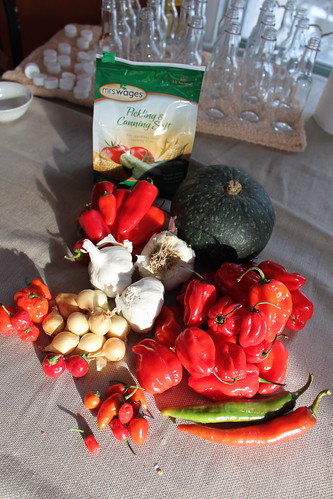
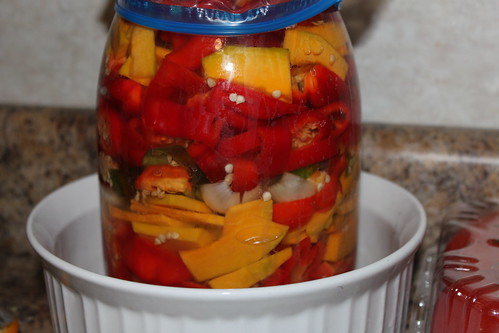
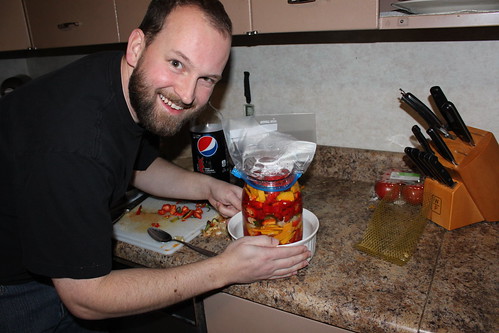
Wish me luck!!!



Wish me luck!!!
Good luck man, I hope to ferment some peppers myself this year. However, after reading this topic it seems like much, much more research should be done...
Good luck man, I hope to ferment some peppers myself this year. However, after reading this topic it seems like much, much more research should be done...
I'd been looking at these fermentation threads for a long time and I kept saying the same thing. Finally I realized that I was over-thinking it. My advice is to just take the plunge. Measuring out salt and adding it to warm water isn't exactly rocket science. Gathering the whey from the Oikos yogurt turned out to be really easy. Then I just put a couple of spoonfuls of it in with the peppers & brine. Easy-fo-sheezy.
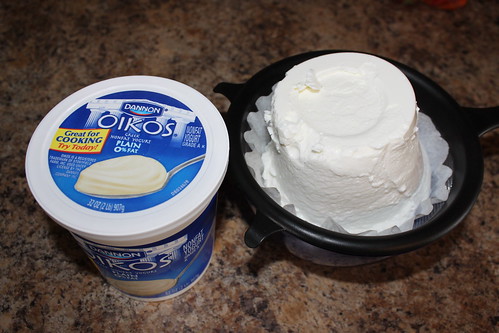
Lots of bubbles, burps, spills & stink. Everything seems to be working.
Exactly! Despite all the science and bull shit you hear every one in here spouting off, this isn't rocket science. It's basic food science 101 that everyone can do. Quite reading and do it!
(null)
Actually humans know more about rockets and rocket science than about the science of the needs that the complex communities of healthy bacterial life have to function well (even to our humble sauce making ends) -an understanding of these needs can help to make a good ferment ; ie...the science is fascinating as well as the simple and age old (largely artisan ) act of fermenting food to extend its life and improve some of its characters ; we can make better stuff by better understanding . I, for one , am learning a lot from reading some of the more technical posts on this forum...even if some of it is attempting to understand rather than comprehensive knowledge .
It is easier in the modern world to understand 'Antibiotic'...anti-life...just kill life, sterilize, pasteurize etc, we have plenty of science to kill . On the other hand 'Probiotic'...pro-life ,working with life/nature is a relatively new science... and one of the keys for the human body to return to its original health.
This is a fantastic thread, but I'm still reticent to "dive in". I'd like a "Fermentation for Idiots" discussion. There are some things that the veterans assume are obvious, but not so for a humble chili grower. And I grow some really nice peppers, including heirloom varieties that are more sweet than hot.
So, let's start. I get a metal cooking pot, fill with water and bring to boil. I add a potato. I let it cook for.... 2 hours? I want it fully cooked and "mushable", no? And then I don't drain, but just have a potato slurry (with the water) after mushing it up. And the add this watery potato to a jar. Like a Mason jar? I bought this airlocks, six, but they seem to fit atop... like woozie (?) bottles. They are about the size of a wine cork. I'm an idiot.
Assume I put this watery potato mix into a Mason jar. When it's cool, I add 2 cups of flour and a packet of dry yeast. Is this now "open air", like a cheese cloth (assuming my newly purchased airlocks are out of the picture)? And then for three days, I add a few tablespoons of flour (each morning). And this is NOT refrigerated... out on my kitchen counter in a Mason jar covered with cheesecloth and a rubber band. After the three days, I put in the fridge for a week after stirring. Then this is considered adequate "hooch", correct?
I'll stop here, but I'd really appreciate some advice on this and going forward. Advice for idiots like me. My next post will be about using the hooch. And, yes, I've read everything here and am very grateful for the advice. But, I'd like it dumbed down a bit...
So, let's start. I get a metal cooking pot, fill with water and bring to boil. I add a potato. I let it cook for.... 2 hours? I want it fully cooked and "mushable", no? And then I don't drain, but just have a potato slurry (with the water) after mushing it up. And the add this watery potato to a jar. Like a Mason jar? I bought this airlocks, six, but they seem to fit atop... like woozie (?) bottles. They are about the size of a wine cork. I'm an idiot.
Assume I put this watery potato mix into a Mason jar. When it's cool, I add 2 cups of flour and a packet of dry yeast. Is this now "open air", like a cheese cloth (assuming my newly purchased airlocks are out of the picture)? And then for three days, I add a few tablespoons of flour (each morning). And this is NOT refrigerated... out on my kitchen counter in a Mason jar covered with cheesecloth and a rubber band. After the three days, I put in the fridge for a week after stirring. Then this is considered adequate "hooch", correct?
I'll stop here, but I'd really appreciate some advice on this and going forward. Advice for idiots like me. My next post will be about using the hooch. And, yes, I've read everything here and am very grateful for the advice. But, I'd like it dumbed down a bit...
You should read the rest of the thread. You really don't need to go through all this rigamarole with yeast and potatoes and flour and slurries and 'hooch', etc... to ferment hot peppers. OP is doing it the hard way. Just mash 'em up, let them sit open air for a day or so, then stick a weight on the mash to keep it under the brine and it'll ferment.
This is a fantastic thread, but I'm still reticent to "dive in". I'd like a "Fermentation for Idiots" discussion. There are some things that the veterans assume are obvious, but not so for a humble chili grower. And I grow some really nice peppers, including heirloom varieties that are more sweet than hot.
So, let's start. I get a metal cooking pot, fill with water and bring to boil. I add a potato. I let it cook for.... 2 hours? I want it fully cooked and "mushable", no? And then I don't drain, but just have a potato slurry (with the water) after mushing it up. And the add this watery potato to a jar. Like a Mason jar? I bought this airlocks, six, but they seem to fit atop... like woozie (?) bottles. They are about the size of a wine cork. I'm an idiot.
Assume I put this watery potato mix into a Mason jar. When it's cool, I add 2 cups of flour and a packet of dry yeast. Is this now "open air", like a cheese cloth (assuming my newly purchased airlocks are out of the picture)? And then for three days, I add a few tablespoons of flour (each morning). And this is NOT refrigerated... out on my kitchen counter in a Mason jar covered with cheesecloth and a rubber band. After the three days, I put in the fridge for a week after stirring. Then this is considered adequate "hooch", correct?
I'll stop here, but I'd really appreciate some advice on this and going forward. Advice for idiots like me. My next post will be about using the hooch. And, yes, I've read everything here and am very grateful for the advice. But, I'd like it dumbed down a bit...
Thanks Pablo. You say "keep it under the brine". I've read that the peppers to salt (Kosher Salt. pickling salt?) should be 30-to-1. What is in your "brine", if not hooch? Just peppers and salt, which is mushy enough to have some liquid which should be adequate to keep the peppers and salt moist and covered? No vinegar yet I assume. And I've read this thread! But the experts are making some assumptions that the audience should know. I can tell you how to grow a pepper and even make it "hotter"... but I don't want to dive into this fermentation process un-educated and waste a bunch of uber-expensive peppers.
Just peppers and salt. Lactobacillus fermentation will take hold on it's own. You could use the run off from plain yogurt (make sure it contains live cultures) if you want a starter, but it's not necessary, just speeds up initial uptake slightly. I don't have a hard and fast rule for salt ratios - the typical brine solution is 5-10% salt from commercial providers. Don't used iodized salt, but any other salt will do. Iodized salt contains chemicals which will stifle the process. Pickling or kosher salt is fine. I don't use vinegar for my mashes, but some people do. It's certainly not necessary. Usually my mashes will take 6-8 weeks to be mostly finished fermenting, but you can let them go as long as you want.
Thanks Pablo. You say "keep it under the brine". I've read that the peppers to salt (Kosher Salt. pickling salt?) should be 30-to-1. What is in your "brine", if not hooch? Just peppers and salt, which is mushy enough to have some liquid which should be adequate to keep the peppers and salt moist and covered? No vinegar yet I assume. And I've read this thread! But the experts are making some assumptions that the audience should know. I can tell you how to grow a pepper and even make it "hotter"... but I don't want to dive into this fermentation process un-educated and waste a bunch of uber-expensive peppers.
So, I couldn't wait any longer. Yesterday, I opened up my jar of fermenting peppers. I was pleasantly surprised to find very little mold on top. I used a clean spoon to skim off the top layer of juice and removed the top layer of peppers. When I was satisfied that I'd gotten rid of the tainted stuff I dumped the rest into the blender and set it to puree. Then I cooked it & blended it & strained it and cooked it again. I managed to get five bottles out of one jar.
Fermentation made my final product 100% better. If I had made this with the exact same ingredients but not fermented it, I would have a completely different and inferior sauce. I'm so glad that I took the leap. It's by far the hottest sauce I've ever made, and the best tasting, too. It's so spicy I had to rate it triple-X.
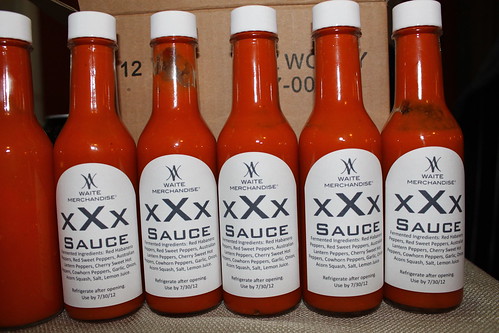
I've also obtained a few Pickl-it containers with airlocks. A relative gave them to me for my birthday. I've got two batches of salsa and some green beans & cauliflower lacto-fermenting away in my kitchen. I'm hooked!!!
http://www.pickl-it.com/
You could easily make your own. These aren't cheap, but I'm impressed with their quality. Their glass weights are handy, too.
Fermentation made my final product 100% better. If I had made this with the exact same ingredients but not fermented it, I would have a completely different and inferior sauce. I'm so glad that I took the leap. It's by far the hottest sauce I've ever made, and the best tasting, too. It's so spicy I had to rate it triple-X.


I've also obtained a few Pickl-it containers with airlocks. A relative gave them to me for my birthday. I've got two batches of salsa and some green beans & cauliflower lacto-fermenting away in my kitchen. I'm hooked!!!
http://www.pickl-it.com/
You could easily make your own. These aren't cheap, but I'm impressed with their quality. Their glass weights are handy, too.
Wow lots of different peppers in that XXX sauce ingredient list! Great color too!
So, I couldn't wait any longer. Yesterday, I opened up my jar of fermenting peppers. I was pleasantly surprised to find very little mold on top. I used a clean spoon to skim off the top layer of juice and removed the top layer of peppers. When I was satisfied that I'd gotten rid of the tainted stuff I dumped the rest into the blender and set it to puree. Then I cooked it & blended it & strained it and cooked it again. I managed to get five bottles out of one jar.
Fermentation made my final product 100% better. If I had made this with the exact same ingredients but not fermented it, I would have a completely different and inferior sauce. I'm so glad that I took the leap. It's by far the hottest sauce I've ever made, and the best tasting, too. It's so spicy I had to rate it triple-X.

I've also obtained a few Pickl-it containers with airlocks. A relative gave them to me for my birthday. I've got two batches of salsa and some green beans & cauliflower lacto-fermenting away in my kitchen. I'm hooked!!!
http://www.pickl-it.com/
You could easily make your own. These aren't cheap, but I'm impressed with their quality. Their glass weights are handy, too.
Okay, more clarity.. and thank you all! And I've read this thread a bunch of times. I'm just not very intelligent. And you'll probably think (after reading), "Doc 'sort of' gets it... but he's somewhat dense. He's close, but not really getting it".
Resolved: make a great pepper mash to use as a base for hot sauce
- I get my favorite peppers that I want to ferment (chef's choice)
- I cut off the stems, but leave the seeds and membrane intact (personal choice or is there some advantage to getting rid of "rind" or tough ends (?)
- I use a food processor to pulverize the peppers and add them do a mason jar (that's what I can easily buy)
- Okay, add maybe 5%-6% salt, not ionized (sp?), but kosher or, better, pickling. Thinking about that gourmet stuff, like pink Hawaiian "lava" salt... for another thread!
- Smash down, remove any air... stir up the salty slurry... establish a young "mash"
+ I bought a half-dozen air-locks, and they look really cool and well-designed... but they seem to be made for "bungs" (beer/wine). They are the size (diameter) of a.... dill pickle. Bad purchase? What the hell can I use them for?
- The alternative is a layer of cheese-cloth(s) and some sort of weight to assure submersion. Can I get a stone from my yard and boil it clean? A white stone... keeping the veggies under brine. I'm not clear on these "glass beads". Sounds kinky.
- I will make these airlocks work, some how... so the pre-pubescent salty pepper mash will sit at room temp for... 4 days, with said "protection". Or is it 30+ days?? ROOM TEMP. Are the second through 4th-8th weeks refrigerated? Sealed?
- I'll probably also have peppercorns, allspice berries, maybe cardamom pods, lemon grass, etc. in the mash (can't see any harm there). I buy cooking spices in pod/seed form (and grind them down for cooking, NOT for this exercise).
- I'm on-board with buying some nice Greek yogurt and using the whey... along with some distilled/Spring (non-tap) water and previously addressed "salt"... HOW would this addition coincide with the simple (Chile Pepper)/SALT starter? Is the whey starter geared to "pickled peppers" (and carrots and celery, etc)?
- Am I mixing up pickling peppers with pepper mash?
I also bought a PH tester... and I understand ambient temps are important... but that's too hard-core for me at this point. For another thread.
I grow some interesting heirloom peppers; I don't mind paying a little more $ to ensure their viability.
I know... over-thinking... it's a bane...
Resolved: make a great pepper mash to use as a base for hot sauce
- I get my favorite peppers that I want to ferment (chef's choice)
- I cut off the stems, but leave the seeds and membrane intact (personal choice or is there some advantage to getting rid of "rind" or tough ends (?)
- I use a food processor to pulverize the peppers and add them do a mason jar (that's what I can easily buy)
- Okay, add maybe 5%-6% salt, not ionized (sp?), but kosher or, better, pickling. Thinking about that gourmet stuff, like pink Hawaiian "lava" salt... for another thread!
- Smash down, remove any air... stir up the salty slurry... establish a young "mash"
+ I bought a half-dozen air-locks, and they look really cool and well-designed... but they seem to be made for "bungs" (beer/wine). They are the size (diameter) of a.... dill pickle. Bad purchase? What the hell can I use them for?
- The alternative is a layer of cheese-cloth(s) and some sort of weight to assure submersion. Can I get a stone from my yard and boil it clean? A white stone... keeping the veggies under brine. I'm not clear on these "glass beads". Sounds kinky.
- I will make these airlocks work, some how... so the pre-pubescent salty pepper mash will sit at room temp for... 4 days, with said "protection". Or is it 30+ days?? ROOM TEMP. Are the second through 4th-8th weeks refrigerated? Sealed?
- I'll probably also have peppercorns, allspice berries, maybe cardamom pods, lemon grass, etc. in the mash (can't see any harm there). I buy cooking spices in pod/seed form (and grind them down for cooking, NOT for this exercise).
- I'm on-board with buying some nice Greek yogurt and using the whey... along with some distilled/Spring (non-tap) water and previously addressed "salt"... HOW would this addition coincide with the simple (Chile Pepper)/SALT starter? Is the whey starter geared to "pickled peppers" (and carrots and celery, etc)?
- Am I mixing up pickling peppers with pepper mash?
I also bought a PH tester... and I understand ambient temps are important... but that's too hard-core for me at this point. For another thread.
I grow some interesting heirloom peppers; I don't mind paying a little more $ to ensure their viability.
I know... over-thinking... it's a bane...
Okay, more clarity.. and thank you all! And I've read this thread a bunch of times. I'm just not very intelligent. And you'll probably think (after reading), "Doc 'sort of' gets it... but he's somewhat dense. He's close, but not really getting it".
Resolved: make a great pepper mash to use as a base for hot sauce
- I get my favorite peppers that I want to ferment (chef's choice)
- I cut off the stems, but leave the seeds and membrane intact (personal choice or is there some advantage to getting rid of "rind" or tough ends (?)
- I use a food processor to pulverize the peppers and add them do a mason jar (that's what I can easily buy)
- Okay, add maybe 5%-6% salt, not ionized (sp?), but kosher or, better, pickling. Thinking about that gourmet stuff, like pink Hawaiian "lava" salt... for another thread!
- Smash down, remove any air... stir up the salty slurry... establish a young "mash"
+ I bought a half-dozen air-locks, and they look really cool and well-designed... but they seem to be made for "bungs" (beer/wine). They are the size (diameter) of a.... dill pickle. Bad purchase? What the hell can I use them for?
- The alternative is a layer of cheese-cloth(s) and some sort of weight to assure submersion. Can I get a stone from my yard and boil it clean? A white stone... keeping the veggies under brine. I'm not clear on these "glass beads". Sounds kinky.
- I will make these airlocks work, some how... so the pre-pubescent salty pepper mash will sit at room temp for... 4 days, with said "protection". Or is it 30+ days?? ROOM TEMP. Are the second through 4th-8th weeks refrigerated? Sealed?
- I'll probably also have peppercorns, allspice berries, maybe cardamom pods, lemon grass, etc. in the mash (can't see any harm there). I buy cooking spices in pod/seed form (and grind them down for cooking, NOT for this exercise).
- I'm on-board with buying some nice Greek yogurt and using the whey... along with some distilled/Spring (non-tap) water and previously addressed "salt"... HOW would this addition coincide with the simple (Chile Pepper)/SALT starter? Is the whey starter geared to "pickled peppers" (and carrots and celery, etc)?
- Am I mixing up pickling peppers with pepper mash?
I also bought a PH tester... and I understand ambient temps are important... but that's too hard-core for me at this point. For another thread.
I grow some interesting heirloom peppers; I don't mind paying a little more $ to ensure their viability.
I know... over-thinking... it's a bane...
You may want to use traditional mineral water rather than distilled water which has been boiled and rid of the mineral content. Tap water will work if boiled to remove the chorine content, left out to cool off , can be used in a pinch. I do that with various "starters" used in bread making........it's free, just a little added work with the process.
Greg
